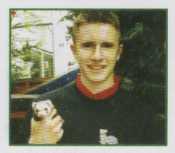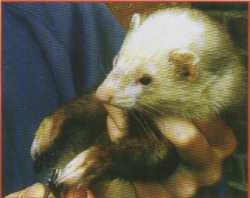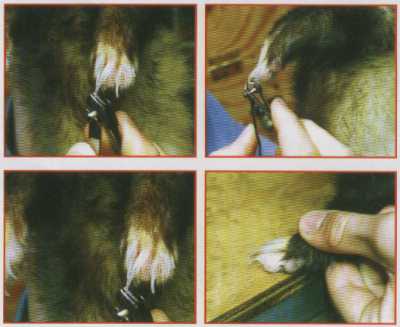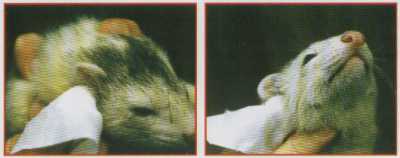Preparing for a Show

MICHAEL SANDERSON, who shows and judges ferrets, is the holder of the British Supreme Championship and many other top awards. By special request, Michael takes Ferrets First readers through the practical preparations needed to get to the top on the showing circuit. His clear instructions are also sound advice for general ferret care.
Clipping nails and cleaning ears are tasks every ferret owner either doesn't particularly enjoy - or simply dreads. Ferrets never seem to keep still for more than a few seconds and they are always more interested in what is going on around them. Nails and ears are not the only things that need to be prepared before a show but we may as well start with the most awkward.
Nails should be trimmed with either nail clippers intended for dogs and cats or human nail clippers. Those designed for people are probably better because they are smaller and much quicker to use. Scissors must never be used as these can seriously damage the nail or even tear it away from the foot.

Remember never to cut the nail too short. Ferrets need longish nails. They walk on the flat part of their foot, not on the toes, and the nail must be long enough to curl around and touch the ground when the ferret stands. The nails are a key tool for the ferret. The use them for climbing and to defend themselves. At the base of the nail is a sensitive pink area called the quick. Never cut anywhere near this as it will cause the ferret serious pain. Rightly speaking, you should not be trimming anywhere near this area but accidents can happen. Your ferret could jump forward just as you snip with the cutters. If the quick is caught and bleeds, use a bar of soft soap to stem the bleeding.
'If you have a show on a Sunday, trim nails the weekend before'
There is no right and wrong way of holding the ferret when trimming but both the ferret and its paw must be held firmly and steadily in place to reduce the risk of sudden movement as you clip. Some people may prefer it if someone trims while another person holds. Almost everyone has one particular ferret that really won't keep still. The best thing to do in this situation is to 'scruff' the ferret by holding it gently up by the loose skin on the back of the neck with thumb and flat part of the index finger. This method may not sound very kind but it caused no discomfort to the ferret and, in most cases, it won't move at all.
Once the ferret is held securely, you can begin to trim the nails, leaving in the full curve and a bit more. Check your trimming by allowing the ferret to stand flat on its foot, making sure the nail curls round to just touch the floor. All nails should be trimmed to the same length and don't cut them within a week of the show. If you have a show on a Sunday, trim the nails the weekend before. This allows them to lose their square edges and become round again.

Another useful tip is to feed your ferrets, allow them to fall asleep and then pick them out of their nestbox. The ferret is now half asleep and very docile - the perfect time to cut nails. Once you've got the hang of it, you'll sail through.
Nails on the back feet do not need cutting very often. I've had most of my ferrets from kits and never needed to trim their back nails.
Cleaning ears is far easier. Just remember never to use cotton buds. These push dirt back into the ear and can cause damage if pushed too hard. The ideal things to use are moist baby wipes that come in a cylinder-like tub. These clean dirt away from the ear.
'Clean ears only where you can see, not where the judge will never look anyway'
Hold your ferret in a comfortable way so that its head is secure. Holding with the thumb and little finger around its back end and under the front legs, with the other fingers placed over teh top of the shoulders and neck is often best. Wrap the wet wipe around the index finger of your other hand and make slow circular movements around the ferret's ear. Clean only where you can see, do not push right into the ear, where the judge will never look anyway. Again, if you have a particularly difficult ferret, the scruffing method can be used.
Ears need only ever be cleaned before a show. The best way of ensuring clean ears on the day is to give them a first clean, without removing every bit of dirt, the night before and add the finer touches the next morning. If you get your ferret's ears perfectly clean the night before, more wax will have accumulated by the morning.
If you have ferrets that do not show it is unnecessary ever to clean their ears as they clean naturally. Regular checks will ensure that ears are healthy and feee from mites.

Teeth are important to a ferret's success at shows. Ideally, they must be white and complete. This is not something you can prepare a couple of days before. Teeth must be looked after all year round. Ferrets are meat eaters and to keep their teeth white, strong and complete it is necessary to feed them fresh meat on the bone. Cooked meat is unnatural to ferrets and will not help to maintain teeth.
Rabbit is the number one meat for ferrets but chicken wings and drumsticks are also ideal. Ferrets like to chew in their spare time and if it's not on bones, it could be on the metal mesh on their hutch. This will chip away and snap teeth, spoiling the ferret's chances at a show. Never give cooked bones as these will splinter in the mouth.
'Logun, who is British Supreme Champion, has never had a bath'
Your ferret's coat must be clean, smooth and oily. Although I would not recommend shampooing ferrets, a wash every so often in plain water is a good way to freshen the coat without stripping it of its natural oils. A clean bed, plenty of brushing and the occasional rinse with plain warm water will keep coats clean. Never shampoo a ferret before a show. The judge will know straight away and you won't get the top prizes.
A correct diet will provide oils for a smooth and natural coat. Cod liver oil is a good treat for a nice coat. My mitt hob Logun, who is British Supreme Champion, has never had a bath but the correct care means he has a clean and natural coat.
Don't overfeed your ferret, provide plenty of wood shavings to keep feet and nails clean and try to use shredded paper instead of hay and straw, which will discolour lighter ferrets.
If you follow these guidlines, you will increase your chances of success by having a perfectly prepared ferret to show.
Good luck,
Michael
